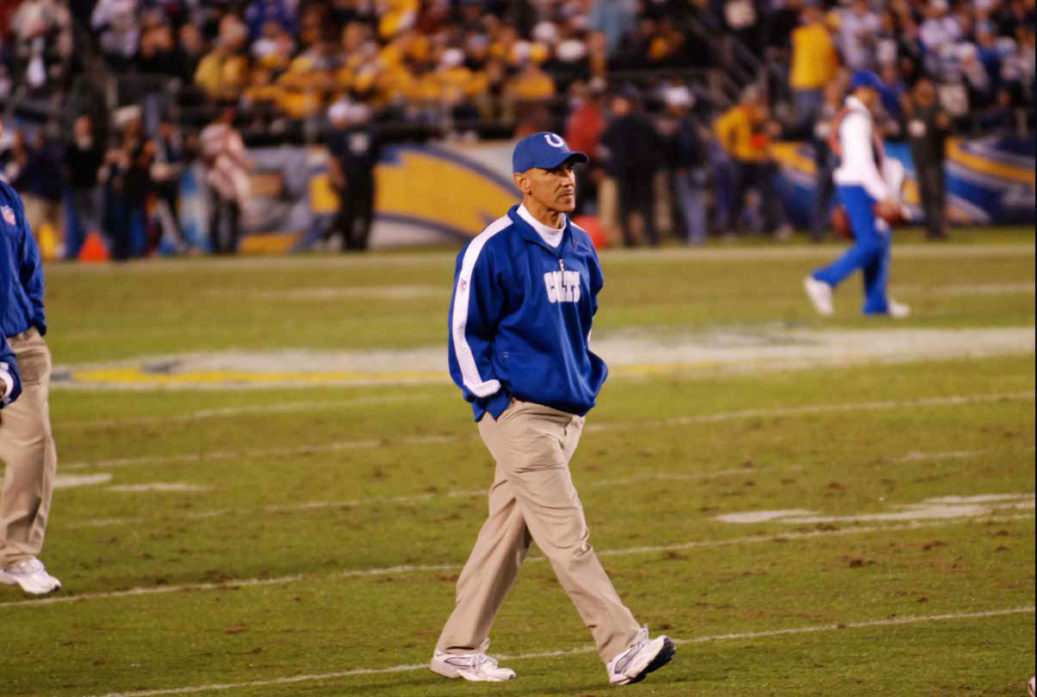Pro coach Tony Dungy sees everything through the lens of Jesus Christ
Tony Dungy is one of the most celebrated figures in pro-football history. Starting his National Football League playing career in Pittsburgh, he found success as a defensive back and later on special teams for the Steelers in 1977 and again in their Super Bowl championship season the following year, leading with interceptions on the team. Dungy would go on to play for the San Francisco 49ers and finally end with the New York Giants in 1980.
After retiring as a player, Dungy would go on to a historic coaching career, one marked by many firsts: the only coach to defeat all 32 NFL teams, the youngest assistant coach at age 25 and youngest coordinator at 28 in league history.
Dungy has seen the highest heights of professional football and the lowest lows, and through it all, his faith has guided him.
“I think you can glorify the Lord in every circumstance, how you respond to failure, how you respond to disappointment says a lot more than how you do in successes,” Dungy says, in an interview posted on I am Second.
Dungy found success despite bucking many coaching trends and popular coaching philosophy. He saw the role of coaches as primarily teachers at their core, and strove to treat players with respect at all times, rather than correcting by belittling or yelling, guiding instead of goading. Dungy also made a point of keeping faith and family above football, and was known for his calm demeanour, even when the game was going badly.
“I want to do it the right way, I want to do it so that our young men are people the community is going to be proud of. I want to do it in such a way that we’re doing the right things with our families… I believe it can be done,” Dungy says in his “I am Second” segment.
[Former] head coach of the Buccaneers, Lovie Smith, explains in an interview with Inside Bay Area that working with Dungy taught him that a coach doesn’t have to scream.“I think as you look to young coaches coming up in the ranks, a lot of us have a picture of how a coach is supposed to be, how he is supposed to act…And I think what Tony Dungy showed me is you don’t have to act that way.”
In an interview with Palm Beach Post, Dungy explains, “I really wanted to show people you can win all kinds of ways. I always coached the way I’ve wanted to be coached. I know Lovie has done the same thing. For guys to have success where it maybe goes against the grain, against the culture…. I know I probably didn’t get a couple of jobs in my career because people could not see my personality or the way I was going to do it…. For your faith to be more important than your job, for your family to be more important than that job…. We all know that’s the way it should be, but we’re afraid to say that sometimes. Lovie’s not afraid to say it and I’m not afraid to say it.”
Dungy put out his coaching philosophy in detail in his memoir, Quiet Strength: The Principles, Practices, and Priorities of a Winning Life, a book that made such an impact on former Miami Dolphins head coach Cam Cameron that he bought 1,000 copies to give away.
“It dispelled so many myths about the coaching business—that you had to be a yeller and a screamer to win. You can be your own person, treat people with respect, be very demanding but demanding in a way that doesn’t trample on people. And you don’t have to give up your faith to win in the NFL. It confirmed and re-affirmed an awful lot of the beliefs I held about coaching.”
However, Dungy also faced many trials in his career. Despite a winning record with the Buccaneers who were within inches of making the playoffs in 1998, won their first division title in 1999, and made the playoffs in 2000 and 2001, Dungy was fired in 2002 for failing to win a Super Bowl. The following season the Buccaneers won Super Bowl XXXVII, and even though he was replaced, many credited Dungy with constructing the championship team.
“God has taken some unexpected things in my life, over and over, and really I think tried to find out if I was going to stay with him, or if I was ever going to get to the point where I say this is too much, I’m going to go my own way,” Dungy says in his “I am Second” segment.
“That to me is one of the hardest things in life… when what you hope for or what you dream about, what you pray for, and it doesn’t come through,” Dungy says. “I had to realize it worked out. It just didn’t work out the way I had planned.”
Despite the disappointment, Dungy never gave up. Though the thought of never winning a Super Bowl would be a bitter pill to swallow, Dungy decided he could live with that.
He persevered and was later hired by the Indianapolis Colts. In 2007, Dungy would bring his team to the Super Bowl, and on February 4, 2007, the Colts became Super Bowl XLI Champions in a 29-17 win over the Chicago Bears.
Dungy always told his players, “don’t make football everything in your life… how we relate to each other, how we live, what you have in your heart for eternity, how you respond to the Lord, that’s the most important thing. This game will take care of itself.”
When they won the Super Bowl, and before the celebrations could really begin, the team insisted, like after every other game, they do a team prayer.
The effect of Dungy’s coaching style was evident, the team put the Lord first, even at the Super Bowl.
Along with being the first African-American head coach to win the Super Bowl, he was the sixth man to play in a Super Bowl and become a coach of a Super Bowl team. He is also the third person to win Super Bowls as both a player and a head coach.
Dungy’s contributions were felt around the league, helping establish greater diversity within the league, and the institution of the “Rooney Rule” created by Dan Rooney, which gives minority coaches greater opportunity to interview for leadership positions.
Dungy has also spoken with the Fellowship of Christian Athletes, and Athletes in Action, along with founding the mentoring program for youth, Mentors for Life. He has also supported organizations like the Prison Crusade Ministry and Family First and helped launch the Basket of Hope program at the Riley Hospital for Children, bringing toys and games to hospitalized children. Along with the basket of toys, a Hope Tote is included, which includes a journal, a Bible and Christian music.
“Every decision I make in life, I’m going to make it through the lens of Jesus Christ, I’m going to put Him out there first,” Dungy says in his “I am Second” segment. “My own feelings, my own thoughts, my own desires, are going to be second. It’s that simple and if we do that Christ promised that He’d come into our lives, He would be our head coach and He’d guide us to that victory, that ultimate victory.”
About


